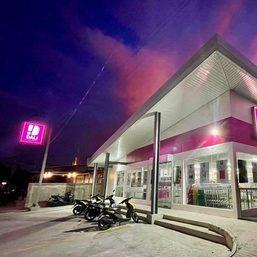SUMMARY
This is AI generated summarization, which may have errors. For context, always refer to the full article.

MANILA, Philippines – When Fully Booked suddenly announced that they would be closing down three of their Metro Manila branches for good, bookworms and loyal patrons around the city were crushed. As if the pandemic wasn’t harsh enough, now their favorite community bookstores had to go, too?
The worst part was that most patrons couldn’t physically say goodbye – by the time Fully Booked announced the closures on January 13, Fully Booked’s branch in Torre Lorenzo, Taft Avenue already closed the day before, the Century City Mall branch was closing shop on that day, and the Ayala Vertis North branch only had a few weeks left. Their S’Maison branch was also temporarily closed until further notice.
Patrons were at an emotional loss – a favorite safe place, hangout spot, and reliable refuge they used to frequent pre-pandemic would no longer be waiting for them after.
However sudden the announcement was, many weren’t too shocked. It was inevitable – the pandemic has ravaged almost every industry, especially the retail sector – but the expectation didn’t make the reality feel any less sad. And what may be most unsettling for many was the fact that such a big name wasn’t spared. What did it take for such an established, successful bookstore chain to buckle to the pandemic’s dire effects that suddenly? What does this mean then for the smaller, local businesses and struggling mom-and-pop shops?
However, despite news of the closures, Fully Booked reassured customers that they wouldn’t be going anywhere. Other branches would still be open, and customers could still order via their website. Despite closing a few doors, their other doors would remain open. And for a bookstore that started as a mere specialty shop in 2003 and organically grew to what we know as Fully Booked today, the homegrown brand tells Rappler why they aren’t ready to close that chapter just yet.
From Bibliarch to Fully Booked: Turning the page
Fully Booked actually started as a niche bookstore selling only art and design books, because of founder and managing director Jaime Daez’s education and training as an architect. Daez noted a lack of these materials in the local market, and brought it upon himself to meet that demand. He then started what was used to be called Bibliarch.
“Eventually, our customer base grew, and so did their demand for a wider selection. It was an organic and gradual growth, always striving to be customer-driven,” Daez told Rappler, sharing how Fully Booked was born.
Almost two decades later, Fully Booked now has 27 stores nationwide, plus a Metro Manila and provincial online store. They also have shops on Lazada and Shopee. But prior to their recent strong online presence, Daez shared that Fully Booked’s main pre-pandemic focus had always been the growth of their physical stores. The Fully Booked website, back then, was more for customers who didn’t have a Fully Booked branch to visit near them.
But the pandemic changed that. Demand for online transactions spiked, and suddenly, customers who would spend hours shelf shopping and book surfing inside their favorite branches no longer showed up. Plastic covers remained unopened; books gained dust on shelves. Since March 2020, Fully Booked’s branches have never been the same.
A closed book
“Like all retail stores, the challenge for us was the huge decrease of people walking into our stores due to the pandemic,” Daez said. The pandemic saw Fully Booked’s first branch closure at Venice Grand Canal Mall in August 2020, only a few months after Fully Booked reopened their online store in April for Metro Manila and provincial deliveries.
“We needed to adapt to the situation, and pivot by selling more online. Instead of us expecting the customers to walk into our stores, we need to do everything possible to bring the product directly to the customer in the comforts of their home,” Daez said. They did so by increasing the inventory and product selection in their e-commerce channels.
But because of this focus, other aspects of the businesses had to suffer – Daez said that one of the initial challenges they had was temporarily closing down “non-essential” physical stores. These decisions, albeit difficult, were vital in keeping the brand as a whole alive.
“Our physical stores had been our focus and main source of income. Closing the stores temporarily would mean a stop in operations for all of our branches, no income coming in to the business, and everyone being worried about their jobs,” Daez said. But sadly, it had to be done.
‘The End’ for certain branches
Seeing your favorite branch close down almost felt like having to say goodbye to a best friend, sans any closure. Daez understood how much their physical presence meant to patrons, especially to those “who have already established a close connection with their favorite branches and customer service staff.”
“They nurtured a relationship with these stores, so it’s only natural to feel some sadness over the news,” he said.
But, in a way, it was heartbreak for a bigger cause – it was no longer sustainable and practical for the whole business to keep all branches open, as much as they wanted to. The Torre Lorenzo branch, for example, was located along Taft Avenue and across De La Salle University, and was hugely “dependent on the patronage of the student population.”
“Due to the move to remote learning during the pandemic, that greatly affected the traffic from students visiting the store. We only announced recently that it would close for good since our lease contract expires at the end of this month,” Daez said. Apparently, it was already temporarily closed since August 2021.
“The other two stores – Century City and Vertis North – closed down in January due to the end of their lease contracts as well. Due to the performance of the store, the lease offer, and the current pandemic situation, we didn’t think it was worth it to keep these stores open,” Daez added.
Challenges, promises, and everything in between
If anyone said that books weren’t essential, a lot of us would violently beg to differ, including Fully Booked. Daez said that one of the biggest challenges of being in retail as a bookstore is being tagged as a “non-essential” business in the pandemic. That, plus the constant and sudden changes in restrictions.
“It is also frustrating to keep adjusting to all the different alert levels that constantly changed over the past two years. But this is something that everyone in the retail business has had to deal with. It has been crucial for us to be adaptable and flexible so we are prepared to meet the changes when they happen,” Daez said.
Importing books during a lockdown is also another challenge that bookstores specifically face. Due to the Florence Agreement, books are tax-free and VAT-exempt, but importation of titles into the Philippines heavily depend on the global supply chain. Daez said that production of the books on the publisher’s side and shipments can be delayed for various reasons.
“The pandemic – with shutdowns and disruptions in manufacturing and logistics – exacerbated this problem. It’s quite tough to make sure that a book will be available on our shelves on release date,” Daez said.
As much as more government support would help, Daez also said that they would rather focus on areas they can control. “The demand for physical books is high, it even increased during the pandemic, and meeting that demand is where we would like to focus on,” he said.
What can Fully Booked’s avid bookworms expect from the bookstore’s next chapter? An acceleration of their e-commerce growth, Daez said, and less of a dependence on their physical stores for future growth.
“At that time, our main goal was to keep the company going and to make sure there would be no employee retrenchment. We were fortunate that we already had our online store pre-pandemic so we just diverted our focus to grow our e-commerce to sustain the business,” Daez said.
“Growing an e-commerce business is different from growing retail stores in terms of operations, marketing, and other aspects. Kudos to the employees for being able to adapt to these changes. Two years later, Fully Booked is still here: committed to the country’s growing community of readers,” Daez added, reiterating that e-commerce will continue to be the key growth area for the brand moving forward.
“We assure all the readers in the Philippines that Fully Booked is not going anywhere. As long as our stores remain profitable, we will keep them open. We are very committed to getting books into the hands of readers, no matter their age, location, or genre preference,” Daez said.
And we have no doubt that they will continue to do so, pandemic or not. – Rappler.com
Fully Booked still has operational branches in the following locations: Eastwood Mall, Gateway, Katipunan, Trinoma, SM North EDSA, SM City Fairview, UP Town Center, Alabang Town Center, Ayala Malls Manila Bay, Bonifacio Global City, Evia Lifestyle Center, Glorietta 3, Greenbelt 5, Rockwell, SM Aura Premier, SM Mall of Asia, SM Southmall, Ayala the 30th, Greenhills Promenade, and Santolan Town Plaza.
Their provincial stores include Ayala Malls Central Block and Ayala Center in Cebu; Abreeza Mall, Davao City; Limketkai Center in Cagayan De Oro; and SM City Baguio.
Fret not! Fully Booked is also on Lazada, and you can save more by using these promo codes.
Add a comment
How does this make you feel?




There are no comments yet. Add your comment to start the conversation.